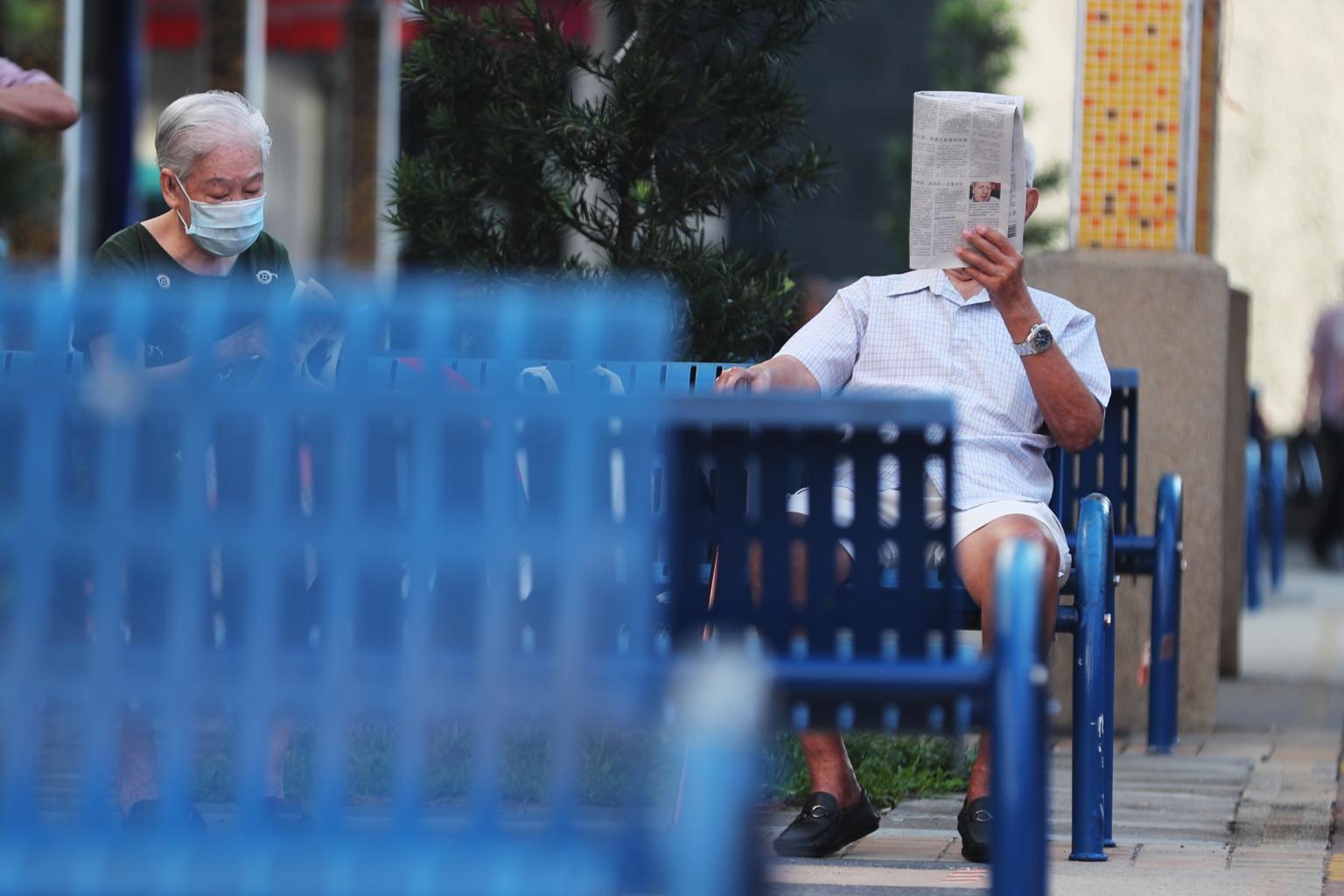Seniors had better mental health than younger adults during circuit breaker: Study
Sign up now: Get ST's newsletters delivered to your inbox

The study found that older adults had faced significantly lower levels of anxiety, depression and stress.
PHOTO: ST FILE
SINGAPORE - Older adults had better mental health than younger people during the circuit breaker in 2020, when all non-essential activities came to a halt in a move to stem the spread of Covid-19.
A study by the Geriatric Education and Research Institute (Geri) found that older adults in Singapore had faced significantly lower levels of anxiety, depression and stress.
This is similar to the findings of overseas research, that younger adults were also more affected mentally by lockdowns, said the study's principal investigator Yu Chou Chuen, a research fellow at Geri.
He presented the study at the Post-Pandemic Challenges And Planning for Social Services online conference organised by the National University of Singapore's Social Service Research Centre on Tuesday (March 15).
The study interviewed 602 Singaporeans in 2020, with 40 the average age of the group of younger adults, while the older group's was 67.
The study also found that regardless of age, respondents who were more adaptable in adjusting their life and lifestyle to the Covid-19 pandemic had lower levels of stress and depression.
While the study did not examine the reasons why older adults had better mental health, Dr Yu offered a few possible reasons.
The older adults had fewer financial and caregiving responsibilities as they may have retired and their children were grown up, compared with the younger group, who worried about their jobs and finances and had to care for both their young children and elderly parents.
Dr Yu added: "As people age, they would have gone through more crises and more ups and downs in life and are better able to manage their stresses."
He also noted that the seniors in his study were all healthy.
Previous news reports have said that seniors are not as digitally savvy as the younger crowd and that they feel more isolated and vulnerable during the circuit breaker, but Dr Yu noted that the elderly are not a homogeneous group.
The same situation can be experienced very differently by people even if they are in the same age and income group, said Dr Ad Maulod, in another presentation at the conference.
The senior research fellow at the Centre for Ageing Research and Education (Care) at the Duke-NUS Medical School noted that those with mobility problems said that life was no different as they were already housebound before the pandemic started.
This was unlike what some of their neighbours living in heavily subsidised Housing Board flats said. Some of the socially active seniors said they felt they would go mad cooped up in their tiny rental flats during the circuit breaker.
Those who had bad relationships with the person they lived with also voiced the same sentiment.
Dr Maulod said Care did five qualitative studies that examined issues such as loneliness and caregiving, and the pandemic's impact in these areas.
About 200 seniors and their caregivers participated in these studies. About three-quarters of these seniors live in HDB rental flats and most live alone.
One finding was that caregivers faced more stress and isolation during the pandemic. This is due to various reasons such as the lack of caregiving support and cutting back on social interactions with friends for fear of infecting the person they are caring for.
Dr Maulod noted that with families having fewer children and seniors living longer, the Government's policy of depending on one's family as the first line of support is an uphill struggle for some families whose seniors need a lot of help with daily life.
Besides the prolonged toll on caregivers, some seniors have strained relationships with their children, or their offspring are struggling to even support themselves.
"Some caregivers are also afraid to seek help for their caregiving stress, as they fear others may think they are not a good son or daughter if they complain about the stresses they face."
There is an urgent need to ramp up the provision of caregiving services in the community to support the family in caring for the senior, he said.
Helplines
• National Care Hotline:
1800-202-6868 (8am - 8pm)
Mental well-being
• Institute of Mental Health’s Mental Health Helpline:
6389-2222 (24 hours)
• Samaritans of Singapore:
1800-221-4444 (24 hours) /1-767 (24 hours)
• Singapore Association for Mental Health:
1800-283-7019
• Silver Ribbon Singapore:
6386-1928
• Tinkle Friend:
1800-274-4788 and www.tinklefriend.sg
• Community Health Assessment Team:
6493-6500/1 and www.chat.mentalhealth.sg
Counselling
• TOUCHline (Counselling):
1800-377-2252
• TOUCH Care Line (for seniors, caregivers):
6804-6555
• Care Corner Counselling Centre:
1800-353-5800
Online resources


